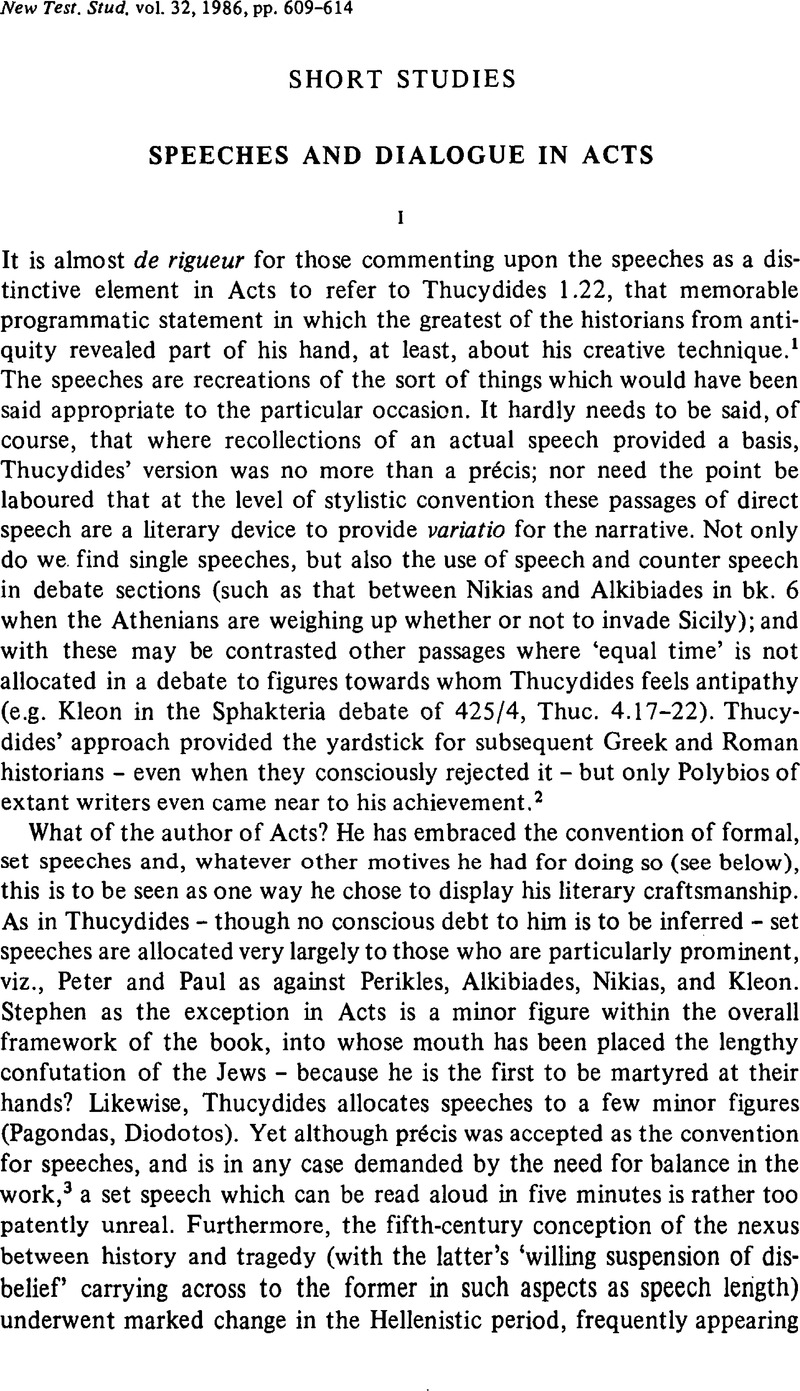Published online by Cambridge University Press: 05 February 2009

[1] The following may be mentioned merely as a representative range: Blaiklock, E. M., Tyndale NT Comm. (1959) 19Google Scholar; Bruce, F. F., The Acts of the Apostles (1952 2) 18Google Scholar; Dibelius, M., ‘The Speeches in Acts and Ancient Historiography’, in his Studies in the Acts of the Apostles (E.T., 1973) 140–3Google Scholar; Downing, F. G., NTS 27 (1981)Google Scholar 545 n. 7, 549 n. 13; Gasque, W. W., A History of the Criticism of the Acts ofthe Apostles (1975) 127Google Scholar (for further references see his index, s.v. Thucydides); Hanson, R. P.C., New Clarendon Bible Comm. (1967) 36Google Scholar; Marshall, I. H., Luke, Historian and Theologian (1970) 72Google Scholar; Neil, W., New Century Bible Comm. (1973) 44Google Scholar; Packer, J. W., Cambridge Bible Comm. (1976) 30–1Google Scholar; Schneider, G., Die Apostelgeschichte 1 (1980) 97 n. 78Google Scholar; Weiser, A., Die Apostelgeschichte (1981) 30.Google Scholar Among recent commentaries Schneider's treatment of the speeches (95–124) is easily the most useful. For a bibliography on the Thucydidean speeches - a minor industry in itself – see W. C. West's list (to 1970) in Stadter, P. A. (ed.), The Speeches in Thucydides (Chapel Hill, 1973) 124–65.Google Scholar
[2] See the concise discussion, with references to Polybian passages, in Walbank, F. W., Polybius (Berkeley, 1972) 43–6.Google Scholar
[3] Proportional to the overall size of Acts the speeches do fit in well, with the exception of Stephen's speech, the only one to approximate to the length of the set speeches in Thucydides.
[4] Walbank, Polybius, 34–40 (the quotation occurs on p. 34), in which Polybios' criticism of other historians is surveyed. For the debate over ‘tragic history’ see Walbank, , BICS 2 (1955) 4–14Google Scholar; id., Historia 9 (1960) 216–34Google Scholar; Brink, C. O., PCPS 6 (1960) 14–19.Google Scholar I have not seen Zegers, N., Wesen und Urspmng der tragischen Geschichtsschreibung (Diss. Cologne, 1959Google Scholar) referred to by Walbank, , Polybius, 34 n. 15.Google Scholar
[5] Only one speech is interrupted in Thucydides, and this instance (2. 72) takes the form of a counterbalancing speech in reply by Archidamos to the Plataian envoys. This disparity serves to underscore how consciously the author of Acts has employed the device, and may be suggestive of stylistic innovativeness.
[6] Implied most recently by Maddox, R., The Making of Luke–Acts (Edinburgh, 1982) 1–2.Google Scholar It should not be denied that content may play some part as well as style: thus several of the interruptions occur when the speaker mentions resurrection (4. 1–3; 17. 32; 24. 22; 26. 24), while another ground of objection is preaching to Gentiles (22. 22, cf. 7. 54; 26. 24). In this note, however, style as a feature has been deliberately emphasized at the expense of content to draw attention to my view that it is rarely given sufficient weight.
[7] Acts 11. 18 and 18. 6 may be examples of such a rounding-off, and a small number of other passages could arguably be regarded similarly.
[8] These two notes have benefited from being scrutinized in draft by C. K. Barrett and E. A. Judge, to both of whom warm thanks are due.